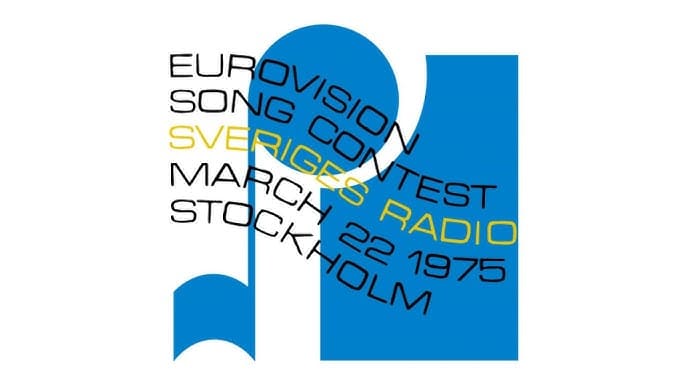Retro Review: Eurovision Song Contest 1975
Hello and welcome to another ESC Retro-Review!
Sit tight in our time machine as we embark on a journey back to 1975—one year after ABBA’s seismic Waterloo victory. Speaking of ABBA, the quartet opted to skip the 1975 contest (and, famously, never returned in person), breaking what’s now a beloved tradition of winners appearing as special guests, at least to give out the trophy, if not to perform.
Nineteen countries were represented—a new record! Turkey made its debut; France and Malta returned after one- and two-year absences; and Greece, fresh from its 1974 premiere, bowed out in protest of the Turkish invasion of Cyprus.
The show opened with an awkward silent intro video—no sound at first, then a swelling instrumental montage of Swedish history, from Viking longships to modern cityscapes. It was meant to be playful, but came off more like a DIY school presentation. Between acts, there were charmingly awkward postcards: backstage clips of each artist painting a self-portrait and their national flag, complete with candid chatter and stray brushstrokes—definitely memorable, if not exactly polished.
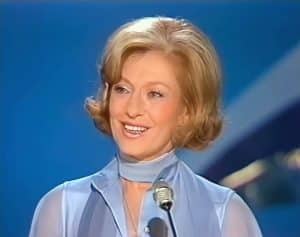
Host Karin Falck followed Katie Boyle’s lead by appearing in a nightgown-style blue dress, greeting us first in Swedish before switching to English in a hushed tone—as if she didn’t want to wake the entire Dome audience.
Highlights
Netherlands – Teach-In – “Ding-a-Dong” (1st place, 152 pts)
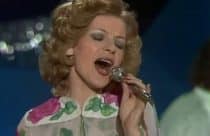
This was the first time in the history of Eurovision that the winning song was actually performed first. The flared sleeves, groovy guitar hooks and chorus chant give it unmistakable ’70s flair—but there’s an undercurrent of melancholy, a bittersweet “saudade” that sneaks in despite lyrics promising “there will be no sorrow when you sing tomorrow.” A deserved victory for one of Eurovision’s saddest-sounding upbeat anthems.
Ireland – The Swarbriggs – “That’s What Friends Are For” (9th place, 68 pts)
Classic big-’70s ballad: matching Johnny Logan hairdos, lapelled light-blue suits, and three backing singers crammed onto a single mic. Polished and pleasant, but ultimately forgettable.
France – Nicole – “Et bonjour à toi l’artiste” (4th place, 91 pts)
A lullaby-lilt in a soft, high register, supported by five perfectly balanced background vocalists. Elegantly executed and well-placed, though it drifts quickly from memory.

Germany – Joy Fleming – “Ein Lied kann eine Brücke sein” (17th place, 15 pts)
Despite finishing near the bottom, this remains one of Eurovision’s most iconic performances. Conductor Rainer Pietsch’s foot-stomped count-in and boundless energy overshadowed the juries, who may have been taken aback by both his wardrobe and his vigor. Fun fact: all backing singers were British pros belting out German lyrics—a rollicking display of cross-channel collaboration.
Luxembourg – Géraldine – “Toi” (5th place, 84 pts)
Starting with Bach’s Prelude in C before tumbling into a lullaby-verse and then a soaring chanson chorus—ambitious but uneven. The white, nightgown-reminiscent dress felt déjà vu from ’74’s fashion.
Norway – Ellen Nikolaysen – “Touch My Life with Summer” (18th place, 11 pts)
Disney-esque opening turns into a breezy ’70s pop number. Norway again found itself near the bottom, despite a perfectly serviceable tune.
Switzerland – Simone Drexel – “Mikado” (6th place, 77 pts)
A circus-pop beat meets a socially-tinged tale of a Mikado game. In her postcard, the conductor warned in Swiss German: “No religious imagery!” The result was catchy and quirky—no strange lyrics lost on anglophones here.
Yugoslavia – Pepel in kri – “Dan ljubavi” (13th place, 22 pts)
Soft Slovenian vocals over country-twang guitar. The harmonies are sublime—fun fact: Pepel in kri later supported Toto Cutugno in Zagreb 1990 as backing singers!
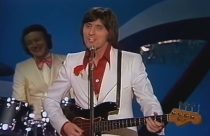
United Kingdom – The Shadows – “Let Me Be the One” (2nd place, 138 pts)
Suits (some glittered), jangly guitars and tight harmonies from both band and backing singers. A crisp marching-rock beat that cut through a weak field to earn a well-deserved runner-up spot.
Malta – Renato – “Singing This Song” (12th place, 32 pts)
Bell-bottom trousers, fringed sleeves, and circus-style orchestration. It’s either a children’s movie theme or a marching band tribute—but Renato’s glee shines through.
Belgium – Ann Christy – “Gelukkig zijn” (15th place, 17 pts)
Late-’60s pop meets early-’70s charm: solid vocal and expressive stage presence. The bilingual lyrics, however—Dutch about carefree wandering, English about romantic bliss—felt thematically disjointed.
Israel – Shlomo Artzi – “At Ve’Ani” (11th place, 40 pts)
Upbeat folk-rock with live guitar rhythm that could’ve used richer backing vocals or a key change. Energetic, but not standout.
Turkey – Semiha Yankı – “Seninle Bir Dakika” (19th place, 3 pts)
This debut entry’s lush strings and plaintive vocals instantly summon the mood of the Moody Blues’ “Nights in White Satin,” all silken melancholy and yearning. Semiha’s heartfelt delivery deserved far more love—yet juries even then seemed wary of songs sung in less-common languages.
Monaco – Sophie – “Une chanson c’est une lettre” (13th place, 22 pts)
Another nightgown silhouette and marching chorus, this time topped with accordion accents. Predictable, but at least endearing.
Finland – Pihasoittajat – “Old Man Fiddle” (7th place, 74 pts)
Unlikely country-pop at Eurovision, yet in a sea of similar-sounding ballads, this upbeat fiddle romp stood out and earned its top-10 finish.
Portugal – Duarte Mendes – “Madrugada” (16th place, 16 pts)
’70s pop-rock veneer with serviceable vocals. Shared backing singers with Belgium made the two entries feel like Eurovision remix tracks.
Spain – Sergio and Estíbaliz – “Tú volverás” (10th place, 53 pts)
Nightgown-meets-suit duo, singing into the distance, never to each other. Funky guitar riff saves it from total yawning.
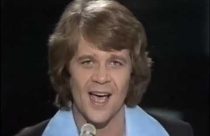
Sweden – Lars Berghagen – “Jennie, Jennie” (8th place, 72 pts)
Host-country pride with those oh-so-familiar black dress backing singers we saw perform with Belgium and Portugal. A pleasant marching-beat number—solid, if unsurprising.
Italy – Wess & Dori Ghezzi – “Era” (3rd place, 115 pts)
Prog-rock meets Hair sensibility, with an African-American singer blending seamlessly in a more uniform 1970s Europe. One of the contest’s best closers—and my personal runner-up.
Interval Act
Several minutes of Swedish painter John Bauer’s fairytale illustrations scrolled on screen while the orchestra unleashed a funky, prog-rock-inspired score. Bafflingly serene… until you half-expect trolls to break into a sing-along.
Voting System
1975 marked the debut of the iconic 12–10–8–7–6–5–4–3–2–1 point distribution. Each of 11 jurors (aged 16–60, gender-balanced, half under 25) scored every song from 1–5 immediately post-performance. The top-scoring song earned 12 points, the runner-up 10, then 8 down to 1 for tenth place. Votes were announced in performance order; juries were “switched off” prior to voting, unable to see or hear previous scores. Double-failed phone links still meant voided votes.
Final Thoughts
- Netherlands – Teach-In, “Ding-a-Dong” – 152 pts
- United Kingdom – The Shadows, “Let Me Be the One” – 138 pts
- Italy – Wess & Dori Ghezzi, “Era” – 115 pts
- France – Nicole, “Et bonjour à toi l’artiste” – 91 pts
- Luxembourg – Géraldine, “Toi” – 84 pts
I’d say 1975 delivered a strong top three—but beyond that, much of the field felt understated. Perhaps Sweden’s budget-conscious production (they even asked other EBU members to chip in) or domestic protests against music commercialization dampened the spark. It’s amusing now, knowing Sweden would later become a global music-export powerhouse.
And in two weeks, we’ll vault into 1976—when Sweden, Malta and Turkey all sat out (Malta for 15 years!) and Brotherhood of Man’s “Save Your Kisses for Me” broke records that still stand.
See you then!
Guest Author: Miljan Tanić

